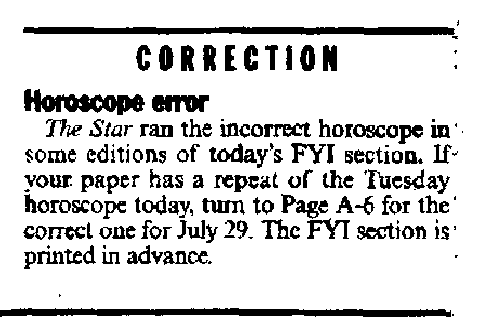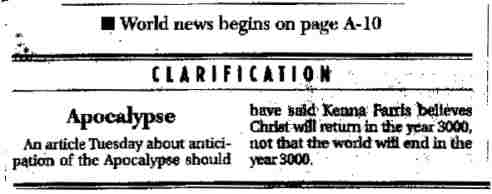| B A R E L Y B A D W E B S I T E |
|
Horoscope |

|
This 1998 correction did not appear in some supermarket rag, it appeared in The Kansas City Star, the major local supposedly legitimate newspaper in the area. The "correct" horoscope? Sheesh. And if the section is printed in advance, don't you want to know your horoscope earlier? |
|
As I see it, here at the beginning of the third millennium, there is still a disturbingly large number of people who believe in such nonsense as ESP and past lives and psychic readings and palm reading and telekinesis and feng shui and Scientology and auras and a veritable host of various energies and . . . well, the list goes on and on. I think the world is bound to be better off if we all of us choose to invest in the truth, or at least not invest in nonsense. And I think we should denounce those con artists who take gullible people's money, and their trust, by pretending to have special powers. Furthermore, the more people believe in one form of nonsense the more likely they are to be receptive to other forms. It can't -- it just can't -- be good for civilization if a significant percentage of us humans not only fail to question absurd notions but eagerly embrace them. To make a decision, to take an action, based on an absurd notion is manifestly unwise. Anyway, Randi performs this demonstration in, say, a classroom of college students. He announces that a horoscopist has done readings on each student. He calls their names and hands each one his or her particular horoscope. Each student is asked to read his own and is then asked to rate its accuracy on a scale of one to five, five being the best. Almost all the scores are fives and the rest are fours. Then Randi asks the students to pass their horoscopes to the student behind them. After a few seconds the students realize that every horoscope was worded exactly the same.
A similar situation arose in my own life awhile back. I worked for a crisis hotline, and at around one o'clock in the morning I was awakened by a call from a woman who explained that she'd learned her boyfriend was cheating on her with a second girlfriend. She said she was thinking of bursting in on them the next night, literally in flagrante delicto, and shooting them with her boyfriend's gun. She knew where he kept the gun, and she knew how to fire it. She would shoot her boyfriend first, then his other girlfriend. (The boyfriend was himself also married, but never mind.) In other scenarios she would shoot them both and execute the coup de grâce by shooting herself. Needless to say, this is a phone call you take seriously. We talked for a long time. I kept trying to get her to go to a hospital or a friend's house or somewhere till she cooled off. I listened to her sobbing and I listened to her raging. But mostly I listened to her sanely and rationally -- if somewhat morosely -- expressing her anger and her pain and her desperation. Whereas my typical hotline conversation lasted maybe five or ten minutes, this one went on for four hours. Deep into hour four she said that she had read her horoscope for that day (which, at that point, was the day before, because she'd called after midnight) and she told me it said she should "go ahead with her plans." At one point in this marathon talkathon I had taken the opportunity of having a cordless phone to retrieve that morning's newspaper from my lawn, and when she said that about the previous day's horoscope, I decided to use Randi's trick. I told her I had her latest horoscope, and she wanted me to read it to her. I opened the paper, found the horoscopes, and read one to her. She was a Leo, and I read her the horoscope for my sign, Gemini. After mulling it over and asking me to re-read it, she concluded that it too was directing her to carry on with her murderous plan. As gently as I could, I revealed that I had not read the "correct" horoscope. When she realized what I had done, she became livid. Not at the people who write and publish horoscopes, but at me! She accused me of tricking her. She said that was not the sort of thing she expected from a crisis hotline volunteer. She never considered the possibility I had hoped to suggest, which was that she shouldn't trust her horoscope to be right if it told her to commit a couple three homicides. I received a total of four suicide calls in six months, which apparently set some sort of record at the agency I worked for. In each case I scoured the newspaper and the news broadcasts for the next several days to see whether anyone had committed suicide who might have been my caller. So far, as far as I can tell, I'm batting a thousand. I have had other experience with tricking gullible people, people who believe in nonsense such as Tarot Cards. I performed many cold reads in an AOL chat room named Tarot, and my success surprised even me. This section is not yet finished . . . |
 |
Here's another correction that seems funny. |
|
Apparently Kenna Farris prefers to have his loopy statements quoted accurately. Kenna puts a lot of stock in what is a wholly arbitrary number, in this case the number 3000. It's no different from 2999 or 3001 or any other number, at least not with respect to Christ's return. If Christ's return is ordained for a particular time, it seems unlikely that that time is determined by our calendar. For one thing, several OTHER calendars are in active daily use throughout the world today by billions of people, including the Chinese calendar, the Jewish calendar, and the Islamic calendar. None of them places special importance on A.D. 3000, because they are all synchronized differently. Why should ours be special? Ours is called the Gregorian Calendar, and it is the best so far. The other calendars are based in part on the lunar month, which is the time between successive new moons. That time turns out to be approximately 29 days, 12 hours and 44 minutes. A lunar year is twelve such periods, which turns out to be 354.3667 days, hence the lunar calendar gets off by a whopping 11 days in a single solar year, i.e., in a single revolution of the Earth around the Sun. The realization that the lunar calendar sucked occurred in Egypt as early as the 27th century B.C. Every so often users of lunisolar calendars have to stick in a new month, called an intercalary month, to get the lunar year to match up with the solar year again. Sheesh, give it up. The Gregorian calendar defines any four-year period as three 365-day years followed by one 366-day year. This is as nearly perfect as a practical calendar can get and still match up with the Earth's travels with respect to the sun. Instead of having to insert eleven days' worth of time like the lunar calendar requires, which is an error rate of 3%, the Gregorian Calendar requires an adjustment of approximately one second per year, an error rate of 0.000003%, which is 100,000 times more accurate. For a friendly yet scholarly discussion of calendars and the measurement of time, go HERE. |
|
|
|
|
|
|